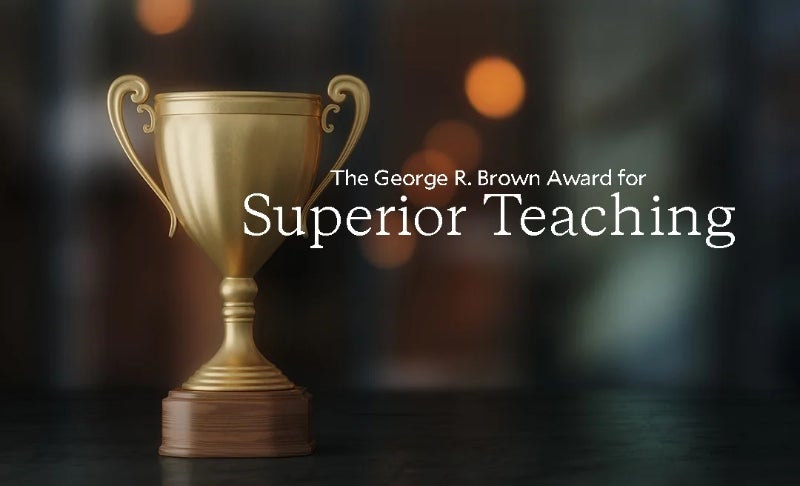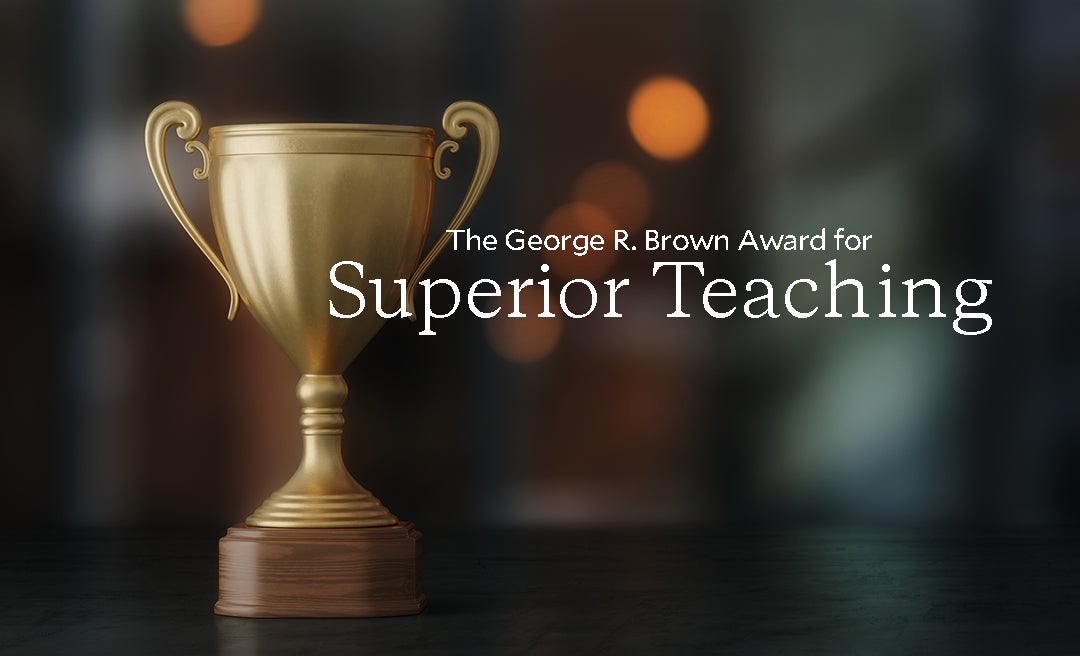
Nine Rice University faculty members received the 2024 George R. Brown Award for Superior Teaching, which honors top Rice instructors based on votes from alumni who graduated within the past two, three and five years.
Rice News asked the recipients for their thoughts on what attributes make for a great instructor in today’s academic climate.
Sabia Abidi, Assistant Teaching Professor of Bioengineering
To excel as an instructor in classrooms today, it is important to have high expectations but always keep your eyes and ears open to what the students may or may not be saying — prioritize connection and open communication. In addition, connecting our classroom content to other disciplines and to modern day happenings enhances the teaching experience, encouraging students to think creatively and critically and understand where our content fits in the bigger picture.
Carl Caldwell, Samuel G. McCann Professor of History and Director of the Program in Politics, Law and Social Thought
We are at a difficult moment in this country and in many other parts of the world right now. At times, communication among opposing sides seems impossible and violence threatens to replace the word. Learning and teaching, however, only take place through communication. Attempts to shut down communication about difficult topics, whether by politicians, students, teachers or political movements, are opposed to the spirit of education. In such moments, courage and empathy are required for effective teaching.
A teacher must have the courage to open the classroom to difficult topics and differing positions. At the same time, the teacher must ask how to do so effectively. Pouring salt into open wounds does not necessarily promote communication, it may simply produce cries of pain or the silence of humiliation. One may also approach difficult topics by asking hard questions in the abstract, such as “What are the limits to state violence, even if it can be defended as legal?” and “What is the morality of violence against noncombatants because of some aspect of their identity?” We can investigate concrete cases in which hate was mobilized and basic rules of civilized conduct overturned through creeping authoritarianism, scapegoating, the militarization of everyday life or the humiliation of entire groups. History offers us no perfect parallels, but there are informative comparisons to be made. Comparisons can help us think through difficult topics while keeping communication going.
There is no ultimate solution to hard problems that does not involve empathetic communication — and learning.
Jamie Catanese, Associate Teaching Professor of BioSciences
I think students will sometimes hold their professors up on a pedestal like we are somehow these amazing perfect beings who always know the answer. Yes, we are amazing. Yes, we worked hard to get to where we are now. Yes, we struggled along the way. Showing students that we are human too, I think, goes a long way to establishing trust in the classroom that it is okay to not know the answer, that their ideas are important, valued and needed and that they bring their own uniqueness and story to the class. Many students lack confidence in their abilities, or they are hesitant because they feel they may be wrong. I always keep in mind and remember how I felt when I was their age. Every interaction provides an opportunity for ‘RESPECT,’ realization of every student’s potential in each class time — not just for me but for them as well.”
James DeNicco, Director of the Principles of Economics Program and Senior Lecturer of Economics
I think there are two main attributes that students look for in an instructor. I think this applies to any teaching climate. Students want an instructor who is passionate and who cares. They want an instructor who is passionate about the material they are teaching and who cares about the individual students themselves. If you have those two attributes, I think students are very willing to forgive other shortcomings they may perceive.
Esther Fernández, Associate Professor of Modern and Classical Literatures and Cultures
I think to make a good instructor in today’s academic climate is to be willing to go beyond your academic discipline and open your mind to students’ needs in a more holistic way. We need to have this flexibility in ourselves and if necessary leave room for this type of more individualized teaching. More than ever I think if possible, we should strive for small classes where the professor can get to know the students and be able to adjust the teaching material and subjects to these other more holistic needs. I have found it more and more difficult to teach in the last few years because I needed to learn to make these types of concessions and teach myself to be flexible, at the same time maintaining the original rigor and excellence of intellectual expectations.
Özge Gürcanli, Adjunct Lecturer of Psychological Sciences
As scholars, we have a responsibility to translate scientific information for public consumption. It’s important for instructors to inspire young minds to be knowledge ambassadors. During my time at Rice, I had the privilege of creating projects for my students to make complex issues accessible to diverse audiences. Through carefully designed experiential-learning curricula, my students worked on hands-on projects such as art exhibits, informational videos and blogs, and they became knowledge creators themselves.
Luay Nakhleh, William and Stephanie Sick Dean of the George R. Brown School of Engineering and Professor of Computer Science and BioSciences
We live in polarized times where the public trust in the mission of academic institutions is probably at an all-time low. It is especially important in today’s academic climate that the instructor cares about their students and that the students leave the instructor’s course having grown in maturity, both technically and emotionally.
Lesa Tran Lu, Interim Rice Synthetic Biology Institute (RSBI) Executive Director and Assistant Teaching Professor of RSBI
At the start of any class I teach, I make it clear to my students that we are partners in learning. Just as I expect them to put their all into learning the course material, I owe it to my students to build an engaging and inclusive environment in which they can learn. Every student brings a unique perspective, set of experiences and challenges. To be great instructors, we should find ways to leverage what each student brings to our class and do so with enthusiasm, empathy and respect. We must also model the values we hope our students to carry with them beyond Rice — a commitment to excellence, a love for learning and a culture of care.
Stephen Wang, Associate Teaching Professor of Mathematics
I think to be a great instructor, you need to know the material you’re teaching really well but also have a good understanding of how students will end up processing and using it. When is an intuitive understanding sufficient versus a more formal one? What learning objectives can only be accomplished by direct instruction versus allowing students to figure them out independently? And what applications are going to be most motivating?

